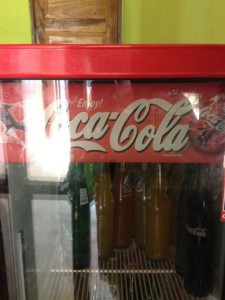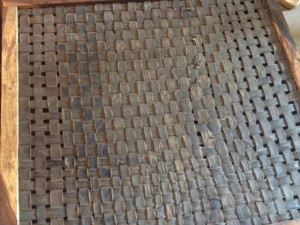It really pays to have connections and stay connected with people working for a common goal, especially when there are not that many people in this country currently working on services for children with learning disabilities and mild intellectual disabilities. There are more services for children with sensory impairments and more well-known services for children with physical impairments and moderate to severe disabilities. But, since these children tend to blend in at least for some period of time, they go to school and do not succeed. There are not many good options in Tanzania for a child who doesn’t finish primary school and hasn’t learned additional vocational skills. After talking to my friends and colleagues from the Irente Rainbow School, I was referred to Brenda and Anton at the Gabriella Centre, the directors and people who have worked with Rainbow staff for a long time through a community rehabilitation network group.
Today we visited the Gabriella Centre. This center offers various services for children learning disabilities, high functioning autism and intellectual disabilities, including children with Down’s syndrome. Their website states the following as their goals:
Gabriella Children Rehabilitation Centre is a non-governmental organization started in July 2009 to ensure that children with disabilities are identified early, properly assessed, and trained to become acceptable community members. The centre consists of an integrated primary school for both disabled and non-disabled children, as well as full-time boarding for those who need it. The on-site occupational therapists and teachers assist children with autism and learning disabilities, and provide assessment, education, and disability awareness to parents, teachers, and the community at large.
We were very grateful to meet Brenda this morning and some of her staff and see the facilities. We were also very impressed with their services and we think that they are a real possibility for a few of the children we are most concerned about who we do not feel can be successful in the present government primary school system; they need more individualized supports. Our next step is to bring the children to the center with a parent for assessment and evaluation. We will provide our assessment results and notes from our interviews with these families to support the evaluation process.
For the younger children, they offered inclusive classroom instruction with typically developing students and Montessori activities to teach problem solving, functional academics, and self-care skills. In addition, they have rabbits that the children learn to care for to practice responsibility and animal caretaking skills.
As the children get older, they learn various vocational skills such gardening, weaving, beading, and clock building.
They recently started building a chicken and goat area to help the children learn those skills.
They also teach business skills such as selling soda and telephone vouchers.
We heard a story about a young woman who has learned to sell soda and vouchers and in the near future they will help her set up a shop in the area to sell independently.
Teachers from the center will continue to follow her and make sure she is doing okay and being successful. I was most excited to hear that they were not just teaching the skills, but offered concrete plans for how the child will move out of the sheltered environment and be reintegrated into the community. So exciting!!
Because their key staff are trained occupational therapists, they offer occupational and physical therapy (these two types are often combined in my experiences in Tanzania and usually offered by OTs). This a homemade Tanzanian trampoline that they made after the American one broke. The bottom is woven tires. Great recycling of materials.






wwiihh this is great information thanks you about this is 🙂 i like the post hehe thanks ya 🙂 i like the post hehe tnice
Very impressive services for children with learning disabilities and mild intellectual disabilities. I agree that they need more individualized support and we can help them through providing assessment, education, and disability awareness to parents, teachers, and the community at large.
spinal traction philadelphia
good post, you have shared really nice post that make me enjoy to read it
hi friends blogs, indeed you provide really helps us, thank you very much 🙂 science knowledge
Your article is outstanding, thank you for sharing! Sharing 71801X new exam questions explanations questions for free—boost your career and salary with this key resource!
Qualitativ hochwertige C-THR89-2405 Prüfungsunterlagen. Gehen Sie einen entscheidenden Schritt weiter. Mit der SAP C-THR89-2405 Zertifizierung erhalten Sie einen Nachweis Ihrer besonderen Qualifikationen und eine Anerkennung für Ihr technisches Fachwissen. SAP bietet eine Reihe verschiedener Zertifizierungsprogramme für professionelle Benutzer an. Untersuchungen haben gezeigt, dass zertifizierte Fachleute häufig mehr verdienen können als ihre Kollegen ohne Zertifizierung.
The viewpoints in the article have been very beneficial to my work. Upgrade your IT knowledge with free CWAP-404 valid guide files. Wishing you all the best!
Thank you for your fantastic article, it’s so thought-provoking! This Latest TA-003-P exam notes helped me get promoted and earn a pay raise. Now it’s free for everyone. Best wishes for your career advancements!
Thank you for your article, it was incredibly thought-provoking. Sharpen your IT skills with free Valid test D-RP-DY-A-24 cram review. Best of luck to everyone!
Die IT-Eliten aus unserem Zertpruefung haben große Mühe gegeben, um den breiten Kandidaten die neuesten Fragenkataloge zur EXIN SIAMP-German Zertifizierungsprüfung zu bieten und um die Genauigkeit der Testaufgaben zu erhöhen. Wenn Sie Zertpruefung wählen, können Sie die EXIN SIAMP-German Zertifizierungsprüfung leichter bestehen. Außerdem werden Sie einjährige Aktualisierung genießen, nachdem Sie die Fragenkataloge zur EXIN SIAMP-German Zertifizierungsprüfung gekauft haben.
That article was a real treasure trove of knowledge. Thanks to the Reliable testcollection AD0-E908, I received a promotion and salary increase. It’s free now for everyone. Wishing you all success in your careers!
Thank you for the wonderful share, the article is truly eye-opening! Enhance your IT knowledge with free Valid practice questions API-577 ebook. Best of luck on your exams!
現在の急速的な発展に伴い、人材に対する要求がますます高くなってきます。国際的なNSE6_FNC-7.2認定試験資格証明書を持たれば、多くの求職者の中できっと目立っています。私たちのNSE6_FNC-7.2問題集はあなたの競争力を高めることができます。つまり、私たちのNSE6_FNC-7.2問題集を利用すれば、NSE6_FNC-7.2認定試験資格証明書を取ることができます。それはちょうどあなたがもらいたい物ではないでしょうか?
I’m in awe of your brilliant article, thank you for sharing! Please wish me all the best for the upcoming 350-201 valid dumps exam!
Your article really stood out, I’m so grateful for it. Get the C_THR87_2411 latest real test answers questions that helped me get promoted and earn more—offered to you for free!
Das Zertifikat für die Salesforce ADM-201 Zertifizierungsprüfung ist notwendig für die IT-Branche. Sorgen Sie noch darum? DeutschPrüfung wird dieses Problem für Sie lösen. DeutschPrüfung ist eine historische Webseite für die Salesforce ADM-201 Zertifizierungsprüfung, wo es eine große Menge von Fragenkataloge dafür gibt. Nach langjährigen Bemühungen haben unsere Erfolgsquote von der Salesforce ADM-201 Zertifizierungsprüfung 100% erreicht.
I’m deeply impressed by your article, thank you for sharing it. HPE0-S59 authorized certification offers high-quality content at no cost.
Your article was so unique, thank you for sharing this fresh perspective. The CSA hot questions content is excellent, and you can get it without any cost.
私たちが直面するプレッシャーはあらゆる面からもたらされます。社会情勢が変化するにつれて、これらの圧力は増加する一方です。 私たちは外部環境を変えることはできませんが、自分の能力を向上させることができます。だから私たちのC-TS4FI-2023練習問題をお勧めます。私たちのC-TS4FI-2023試験問題を勉強すれば、あなたが憧れているC-TS4FI-2023認定試験資格証明書を得るだけでなく、より良いものになることもできます。
Thank you for this amazing article, it left a profound impression on me. Sharing free AD0-E212 cost-effective certification resources—wishing you all the best!